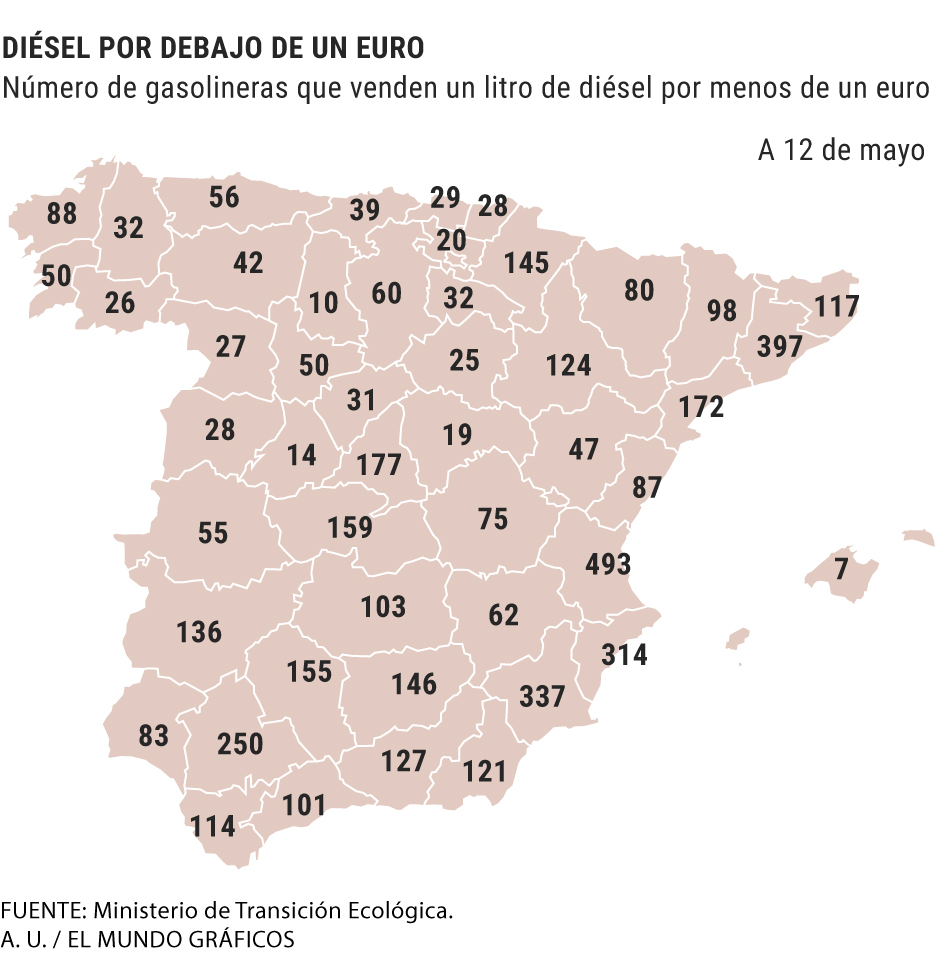The de-escalation plan is going to force many Spaniards to take the car out of the garage to return to their job. To the joy of gradually recovering normality after weeks of economic paralysis, these days will be added "another" for those who have to refuel: the prices of a liter of gasoline and diesel for diesel engines have dropped by an average of 13% during the state of alarm as a consequence of the collapse of the cost of oil, so filling the tank is cheaper today than in the first half of March.
Of course, the price reduction goes by zones and depends on the level of competition between gas stations in each territory, so the driver can find important differences if he looks for the best option. In the case of diesel, a total of 4,986 service stations on the Peninsula already offer liter costs below the psychological barrier of the euro. They make up around half of the country's gas station fleet, excluding those located in the Canary Islands, Ceuta and Melilla, as they enjoy a different tax regime and with much lower prices.
The euro barrier is broken much less in the case of gasoline, fuel subject to higher tax payments in Spain. In this case, 1,246 service stations already sell gasoline for 99 cents or less, that is, one in 10 in Spain. This is clear from the hydrocarbon registry managed by the Ministry for Ecological Transition.
Its owner, Teresa Ribera, is a strong advocate of raising the diesel tax to match it with that of gasoline. The latest proposal from the Executive, paralyzed by its inability to carry out its own Budgets, established an increase of 3.8 cents per liter on this fuel to raise 670 million euros. This first rise would be accompanied by subsequent ones until the tax gap of 10 cents that currently exists between the two fuels is zeroed.
The sinking of the cost of a barrel of oil now opens a new opportunity for the Executive to carry out the increase with the excuse of the budgetary mismatch that the country will suffer due to the response measures to the coronavirus crisis. According to his own calculations, this year's deficit will be equivalent to 10.3% of GDP. Authorities such as the Bank of Spain have already asked Pedro Sánchez for an adjustment plan by cutting public spending or raising taxes for the coming years.
The country's big oil companies have been quick to warn the government that a tax increase at this time could only contribute to further deepening the economic hole Spain is in due to the sinking of consumption. Through the AOP employers' association, these groups have asked Sánchez "not to introduce new fiscal figures or tax increases that reduce competitiveness by establishing taxes on industrial or construction activities or on consumption." And more specifically: "paralyze initiatives to increase the Corporation Tax or the Oil Tax on diesel."
The lowest prices in the country are registered in those regions where competition is greatest after the appearance of automatic or neglected stations. For example, in the province of Valencia alone there are 493 gas stations with the cost of diesel below the euro out of a total of 604 service stations.
The cheapest pump in Spain is located in the municipality of Jumilla , in the province of Murcia, which serves a liter of diesel at 0.71 euros to its cooperative members, most of whom are dedicated to the transport sector. Instead, the most expensive diesel in the country can be found in Santo Tomé (Jaén) at 1.33 euros, always according to statistics from the ministry. This gas station can also boast of having the most expensive gasoline price in Spain -1.43 euros-, while the cheapest with a cost of 0.71 euros is located at kilometer 395 of the N-5, in the Badajoz municipal term.
In accordance with the criteria of The Trust Project
Know more
